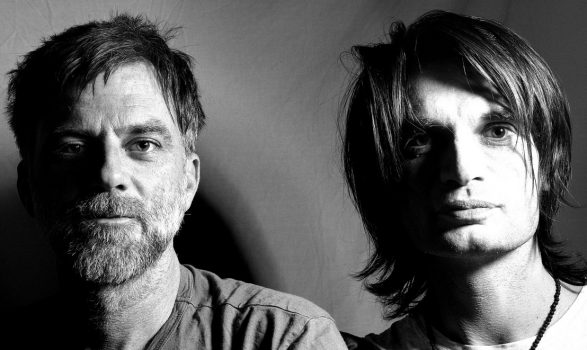There are few who would contest that Jonny Greenwood has a true appreciation for music in all of its forms and genres. Renowned for his imaginative work on his day job in Radiohead, he also has gained a stellar reputation for his work outside the band. He has provided soundtracks for three of film director Paul Thomas Anderson’s movies, and composed for and toured with the London Contemporary Orchestra. Greenwood has collaborations with a number of critically acclaimed modern composers including one of his idols, Polish composer Kzyszlof Penderecki. His latest venture delves into the World Music genre, collaborating with Composer Shye Ben Tzur and The Rajasthan Express. On November 20th the consortium of contributors released Junun. The album is a 2LP/CD release that was produced by Greenwood. Before we go any farther let me be clear this is not a Jonny Greenwood solo project with some interesting global artists as backup, but instead a recording of gifted musicians and composers who were intensely interesting in joining together to see what they could create, Junun is the result. If you are expecting a quasi Radiohead fix to hold you over till the band’s next release you will be disappointed. If instead you are a listener with eager ears and an open mind this release may truly be a revelation.
Junun was recorded earlier this year in a makeshift studio in the 15th century Mehrangarh Fort in Jodhpur, India. All the music was composed by Shye Ben Tzur and arranged by Tzur and Greenwood. The storied Nigel Godrich recorded, mixed and engineered the release. On the record Greenwood performs on guitar, bass, drum machine, computers, his beloved ondes Martenot and keyboards. Never an attention seeker, Greenwood seamlessly blends in with the musical performances of the 19 members of the devotional Sufi Qawwal group the Rajasthan Express.
The project’s origins begin with Ben Tzur an Israeli composer, producer and performer who lives in both India and Israel. He composes instrumental and devotional music, Qawwalis, in Hebrew, Urdu and Hindi. Tzur embarked on a musical journey when as a young man he attended a concert by Zakir Husain and Hariprasad Chaurasia. This concert spurred his love and respect for Indian music. Tzur released his debut album “Heeyam”, translated supreme love in Arabic, in 2003 and followed it up in 2010 with “Shoshan”. “Shoshan” was a cross cultural mix of passion, genres and languages. Greenwood came into the picture when he heard a composition of Tzur’s on an Arabic violin. Intrigued he set out to find out more about Tzur’s works. Eventual the two paired up and the idea for Junun began to emerge. Greenwood states about their collaboration and Junun that” I’m always a little wary of rock bands half heartedly dabbling in World music, itself a slightly greasy term, but there are exceptions, Damon Albarn is one: his work with musicians in Mali is something he is clearly committed to, and I think Shye Ben Tzur is another.”
With Junun the threads of each musician’s background are woven into the composition which is distinctly evocative and moving. Found within the album are Hebrew translations of Sufi poetry and songs sung in Hindi and Urdu. Do not let this scare you off; there is no need to know any of the languages involved to fully appreciate the impact of the music. The compositions are so universally appealing that “Western” ears quickly acclimate to the wondrous sounds. On the album Greenwood is in no way front and center in the compositions, he is just one musician among many, his fingerprints are on the release but his influence is spectacularly nuanced throughout the production.
The title Junun is taken from the word Junoon which means mania or madness of love. The release starts off with the title composition. The song is ebullient and energy laden with a polyrhythmic beat that drives the track and Aamir Bhiyani providing a fantastic brass horn lead that punctuates the song. The track is soulful and refreshing with percussive effects that are off the leash. The song hooks you into the premise of the album and does not let go.
The pre release teaser Roked sounds like something that could come out of a highly evolved multi cultural dance club. It is hard to believe this is Sufi inspirational music. With each pass this song displays another facet of its parts making it a compelling and enticing entry.
After the opening pair of polyrhythmic compositions the release moves to a mesmerizing ballad of sorts. Hu is a longer composition with a very haunting Indian bowed string intro. It unfurls the beauty which dwells in Indian music. The song is serene and moving and seems like a wondrous journey with the singers both in solo and chorus guiding the listener along. Those who have some familiarity with world music will find many things they recognize on the track. What is most fascinating is how beautifully and attractively it is all arranged making for a glorious marriage of World music with Western musical sensibilities.
Chala Vahi Des is loosely translated as let’s go to that region. The selection has an atmospheric start and a delightful Hindustani duet between Afshana Khan and Razia Sultan. It brings to mind the musical accompaniments of the Turkish Sufi whirling dervishes. Kalandar is a longer composition that starts off with captured sounds in the fortress. A feature of the song is Tzur’s breathy flute that complements the arrangement perfectly. The song is delicate and almost ethereal with a dreamlike chime. It builds dramatically across an inspirational aural soundscape making it hard to forget. The title of the song Eloah means in Hebrew a name for God or the Almighty. The song starts with an acapella intro that proceeds into a chant with a soloist singing devotional poetry. It is stunning and resonates long after it is over.
Julus takes a step away from the serenity of the prior four tracks, it is joyful and full of spirit. The percussion filled intro is jaunty. Within the song are many underlying musical influences among them Jazz, Spanish, Indian, and African polyrhythms. It is as if the listener has stumbled upon a glorious combination of musical influences like some modern day musical Tower of Babel. Allah Elohim is the “do not miss” track on the release. It is dramatic with its swirling duel vocals which weave together delivering an amazing textured selection. The song’s title is the name of God in Arabic and Hebrew, on this track Greenwood is recognizable with his contribution on the ondes Martenot adding to the devotional ardor of the song.
Ahuvi or translated “my love” in Hebrew is a favorite track of mine. It is simple but glorious with shimmering strings and evocative vocals. Azov is an amalgam of found sounds and the organic with a nuanced computer guided background structure. Junun Brass is exactly as the title describes a brass composition that when it lets loose is something really exhilarating. Best described as a fusion of jazz and polyrhythmic world beats; it is explosive and enveloping. It is followed by a snippet of found bird sounds given a run through the computer adding horns in dissonance called aptly There are Birds in the Echo Chamber. The final song Mode emphasizes the meaning of the Hebrew word Modeh. Modeh is defined as the first words said in the morning, thanking God for another day that is given. Like that feeling the song is joyously ebullient filled with a panoply of percussion providing an uplifting ending to the album.
https://www.youtube.com/watch?v=XxZ8TPUDLWk
Junun demands that you leave your preconceived notions of music at the door. It asks that you come to it with an open mind and a willingness to explore what for many people are unfamiliar musical stylings. Greenwood utilizes his reputation to introduce a heartfelt endeavor; shining light on a much maligned, ripped off and ignored genre. He along with his other amazing collaborators is introducing to popular music a new idea of sorts, and a unique blending of styles and culture. Tzur deserves numerous accolades for his amazing compositions filled with emotion and inspiration. Greenwood, ever the humble genius with impeccable taste, displays his fantastic producing abilities. He cements his reputation as an arbiter of less travelled musical pathways. Mr. Godrich as with anything he touches does a magnificent job in his capacity. But besides those marquee names The Rajasthan Express is simply amazing, their love of music and commitment to their performances shines through and has enduring impact. The release is a worthy endeavor richly deserving praise and attention.
If Junun appeals to you, make sure to catch the documentary by Greenwood’s long time friend and collaborator the renowned film producer Paul Thomas Anderson who tagged along to film the process of the recording. The documentary and the album are an eye opening look into the collaborative processes of musicians across borders and languages.





Be the first to comment